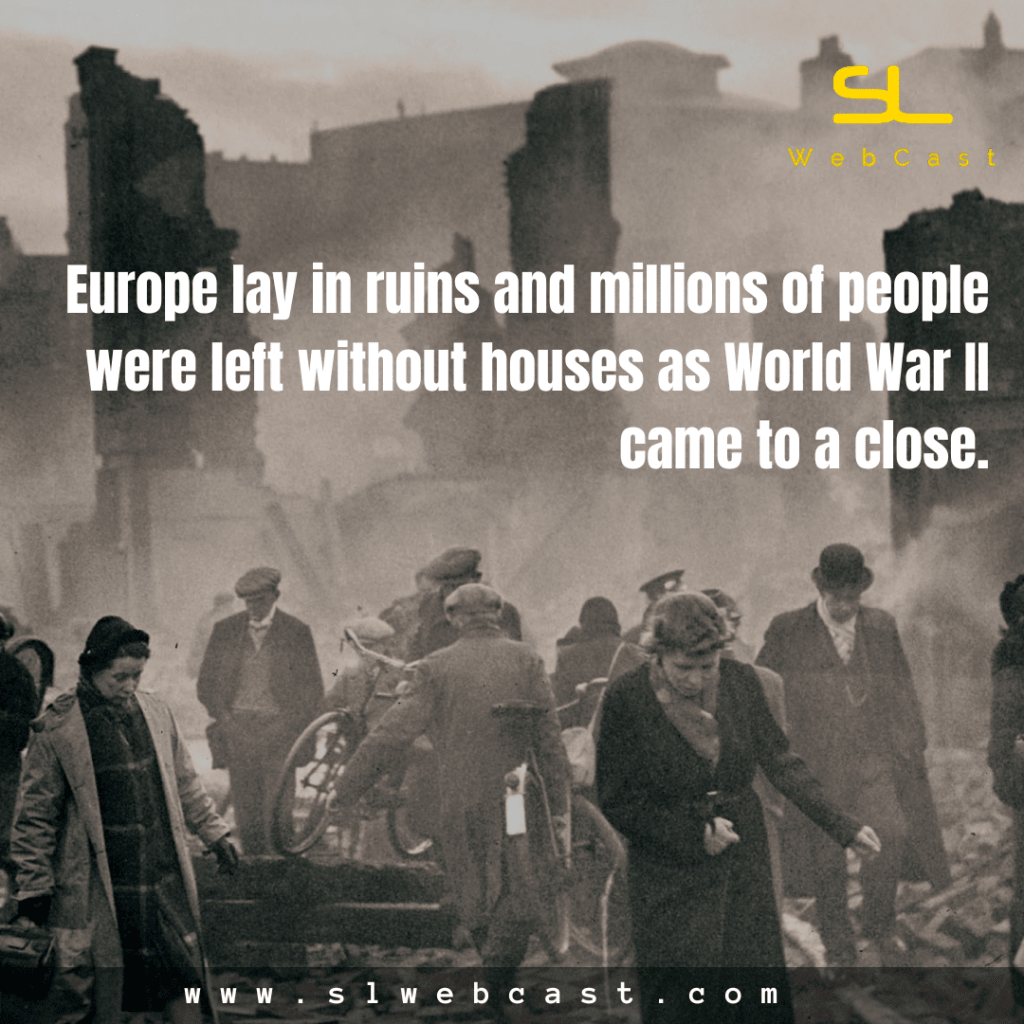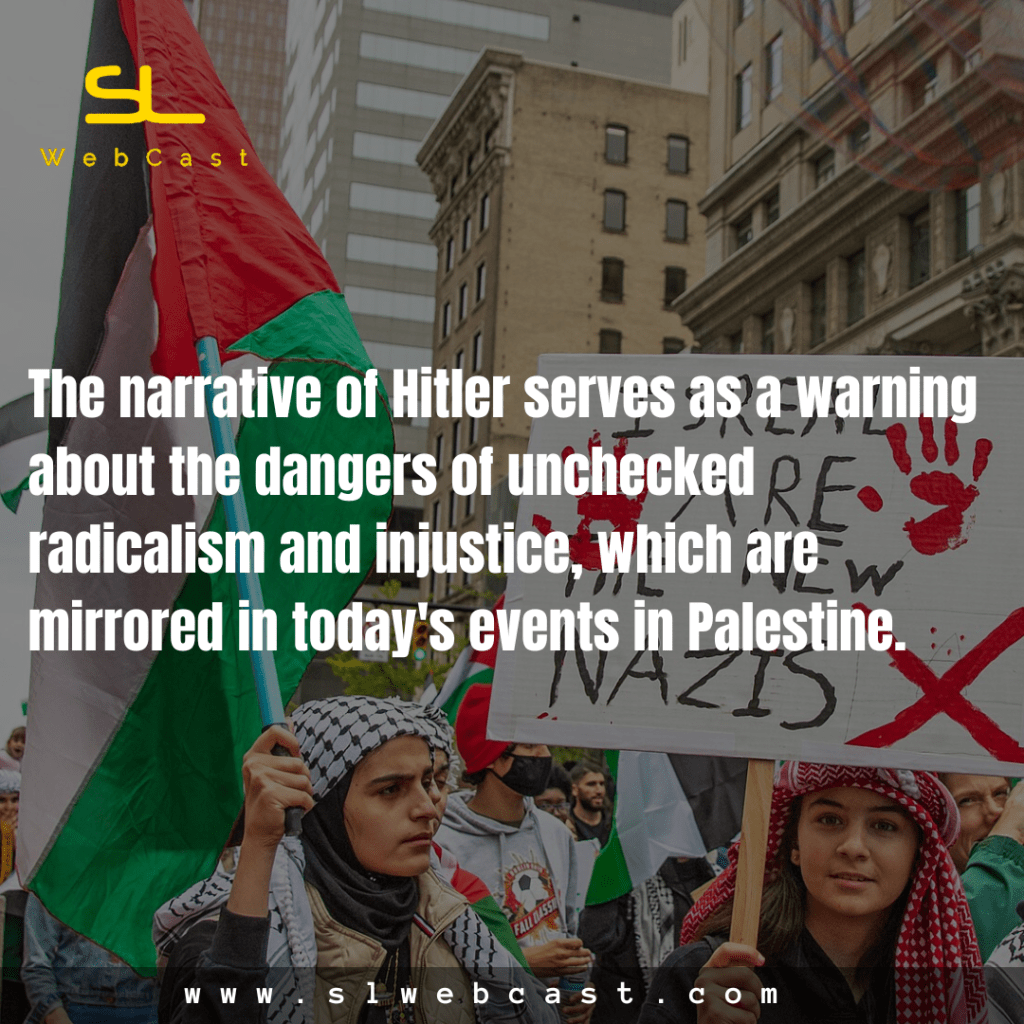The horrible consequences of allowing hatred and power to run amok are brought to light by a few historical instances. One of the most horrific instances is the immense murder and suffering caused by Adolf Hitler’s actions during World War II. Similar patterns are still evident today in other parts of the world, despite the fact that these events occurred a long time ago. Some elements are shared by the ongoing war in Palestine despite its differences, including persecution, displacement, and the high price of holding radical opinions.
Adolf Hitler ran for power in the 1930s on a platform of rebuilding Germany’s might and prestige following the devastation caused by World War I. He was able to gain support by uniting a strong sense of patriotism with bigotry and hatred. Hitler used false information to paint Jews and other minorities as the enemy in order to defend his own policies and claim responsibility for Germany’s problems. This dangerous idea caused millions of people to be persecuted and murdered, especially during the Holocaust. Even though the history and culture of Palestine have changed significantly since then, the imprint of radical ideas is still visible there. Long-standing land disputes and intense national feelings have led to constant warfare.

The suffering of innocent people during Hitler’s rule was among the most terrible aspects of his reign. The Holocaust destroyed cultures, tore apart families, and targeted entire towns. Many were killed, and the survivors suffered severe emotional wounds that would impact them and their offspring for years to come. Similar agony continues to this day in Palestine. Families that have inhabited the same area for many generations are being compelled to move, and a great number of people are always afraid. Children in Palestine are exposed to conflict all their life; they only know bombs, checkpoints, and uncertainty. Living in such a perilous place has a huge emotional and psychological cost. Similar to the suffering endured by Jewish children in the Holocaust.
Europe lay in ruins and millions of people were left without houses as World War II came to a close. Among those who had nowhere to go were Jewish survivors of the Holocaust. Due to the destruction of their towns, many of them were unable to return home. Many Palestinians were compelled to flee their homes in order to make room for the new state of Israel, which was established in 1948 with the intention of providing these uprooted Jews with a new homeland. One clear link between the events of Hitler’s day and the current state of affairs in Palestine is the question of displacement. Nowadays, millions of Palestinians lack a nation of their own and live in refugee camps, much as Jewish refugees formerly roamed throughout Europe in search of protection. When hundreds of thousands of Palestinians were displaced from their homes in 1948 as a result of the Arab-Israeli War, the event is known by the Palestinians as the Nakba, or “catastrophe,” A refugee crisis persists to this day as a result of this incident, much as the Jewish displacement during the Holocaust. Both Jewish and Palestinian refugees’ difficulties demonstrate the human cost of political and ideological disputes. A trauma that impacts people is losing one’s identity and home.

A large portion of the world did nothing as Hitler’s regime carried out its horrific plans during the Holocaust. Though many were aware of the mass murders, ghettos, and concentration camps, they took no action to put an end to it. Some were doing political calculations, some were terrified, and some didn’t care. Regardless matter the cause, millions of people perished in front of the world. In the modern world, the Palestine problem also calls into question the lack of global engagement.Although there has been some worldwide discussion of the matter, not much significant action has been taken. Despite numerous resolutions being approved by the UN regarding the Israeli-Palestinian conflict, no settlement has been reached. People on the ground, caught in the midst of international indifference and political games, continue to suffer in the interim.
This is a concerning lack of action. The prolonged conflict in Palestine is partially caused by the lack of strong global participation, just as the world’s inaction during the Holocaust permitted Hitler’s crimes to continue. As the same patterns of inaction repeat themselves and cause more misery, it appears that the lessons of history are being forgotten.
.

The world vowed “never again” to permit such atrocities to occur following World War II. The purpose of this pledge was to guarantee that the crimes committed during the Holocaust would never occur again. But it is evident from what is occurring in Palestine that this promise has not been fully fulfilled.
Fighting for justice, standing up to oppression, and defending the innocent are all morally imperative. The similarities between Hitler’s Germany and Palestine now highlight the perils of permitting animosity and apathy to spread. Similar to how the world eventually acknowledged the agony of those living under Nazi authority, the suffering of the people of Palestine must also be acknowledged. Like justice for the victims of the Holocaust, justice for the people of Palestine necessitates admitting wrongs committed and striving towards an equitable and long-lasting resolution. The international community must stop talking and start doing in order to defend everyone’s rights, regardless of their origins or religious beliefs.

It is evident that history may teach us valuable lessons about the effects of injustice, intolerance, and apathy when we consider the links between the atrocities committed in Hitler’s Germany and the current situation in Palestine. While there are many differences between the suffering of the Jewish people during the Holocaust and the suffering of the Palestinian people today, there are some commonalities as well. The agony of being without a homeland, the horrible effects of displacement, and the inaction of the international community when it comes to addressing these issues.
The narrative of Adolf Hitler serves as a warning about what might occur when radical ideologies seize power, when people refuse to recognise one another’s humanity, and when obvious injustice goes unpunished. We are reminded of these similar risks by the current circumstances in Palestine, which motivates us to take lessons from the past and fight towards a future in which tragedies like these are unimaginable. Ultimately, the lesson is straightforward but crucial. We must keep in mind the past in order to avoid repeating the same mistakes that were made in the past as well as to pay tribute to those who suffered. Justice must be served to those who cry out for it, whether they come from the Palestinian refugee camps or the extermination camps of Europe. At that point, we will be able to construct a world in which such horrific historical recurrences are non-existent.


